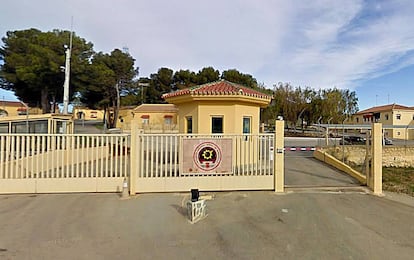Three months on, still no arrests after female soldier claims she was gang raped
Alleged assault at barracks in Málaga would be most serious ever seen in the Spanish Armed Forces, but wait for DNA results slowing case down

Military discipline requires immediacy and exemplary behavior. That is why members of the armed forces – as well as civil guards – are the only members of society that can be held in custody without an order from a judge. But more than three months after a female soldier from an air force base in Bobadilla, Málaga reported being the victim of a gang rape, no one has been detained, arrested or formally accused.
The only person currently missing from the unit is the alleged victim herself, who has been on leave for psychological reasons since then. Two courts – one civil in Antequera and another military in Seville – have been investigating the most serious sexual assault to have ever been reported in the Spanish armed forces, but without any results to report thus far.
The only person currently missing from the unit is the alleged victim herself
The alleged victim, who is 35 years old and from Málaga, filed a complaint on December 12 after suspecting that she had been drugged against her will two nights before, while drinking with colleagues. “I remember the beer tasted bitter,” she told the police.
The next morning, she woke up in a room where the cooks at the barracks usually get changed. The key to the door was on the outside. She had a terrible headache and couldn’t remember anything that had happened from midnight onward.
In statements she subsequently made to the police, she gradually filled in the gaps in her memory. She explained that while in the pub with her colleagues, a sergeant “came closer than he should have done, and started to stroke her leg, leaving her surprised.” At the same time, she realized that “another hand was touching the back of her thigh, which she slapped away to get it off her.”
The alleged victim admitted that they were “confused memories,” and that she could not identify the suspects, leading her to conclude that “she must have been drugged” at the time.
In her last statement, after explaining that “bit by bit” she was remembering images of what happened that night, she related how, once in the changing room and supposedly drugged, “a dark-skinned man moved her while holding her arm and saying things to her.” She also recalled another man “who was breathing very deeply.”
The soldier suspects she was drugged against her will two nights before, while drinking with colleagues
The day after, and on the advice of her colleagues, the soldier took a drugs test, which came back positive for barbiturates. But the test had expired and a subsequent urine analysis did not return the same result, nor did a hair test she underwent several weeks later.
The police did, however, find two semen stains on the beige underwear that she was wearing for the first time that night. Ten soldiers from the Bobadilla barracks provided DNA samples for comparison.
On February 23, in her first statement before the judge in Antequera, the soldier identified “without any doubts and with complete certainty” two of her assailants and “with less certainty” two others, according to her lawyers.
One of the alleged assailants was the soldier who, the day after the events, joked with the victim saying that the next time, she should take better care of her glass. The other is a corporal whom the woman accused of having tried to rape her last August. As a result of this claim, the police arrested the man in December, later releasing him without charge.
The police found two semen stains on the beige underwear that she was wearing for the first time that night
Two of the men accused by the victim as her assailants slept in the same room that night, while the other two slept alone in other rooms, meaning there are no witnesses to their movements.
Lawyers for the victim have called for the men to appear before a military judge, but the public prosecutor has refused, arguing that they should first await the DNA results, which were ordered more than two-and-a-half months ago but whose arrival date is not yet known. For a suspect, appearing before a judge with the knowledge of whether or not there is evidence against them is an advantage that many would envy.
“Not calling them [to court] is unnecessarily slowing down the investigation,” argues Manuel Rincón, from the Rinber law firm in Seville, which specializes in military law. “With the utmost respect for what the judge rules, we believe that justice needs to be imparted with greater speed.”
English version by Simon Hunter.
Tu suscripción se está usando en otro dispositivo
¿Quieres añadir otro usuario a tu suscripción?
Si continúas leyendo en este dispositivo, no se podrá leer en el otro.
FlechaTu suscripción se está usando en otro dispositivo y solo puedes acceder a EL PAÍS desde un dispositivo a la vez.
Si quieres compartir tu cuenta, cambia tu suscripción a la modalidad Premium, así podrás añadir otro usuario. Cada uno accederá con su propia cuenta de email, lo que os permitirá personalizar vuestra experiencia en EL PAÍS.
¿Tienes una suscripción de empresa? Accede aquí para contratar más cuentas.
En el caso de no saber quién está usando tu cuenta, te recomendamos cambiar tu contraseña aquí.
Si decides continuar compartiendo tu cuenta, este mensaje se mostrará en tu dispositivo y en el de la otra persona que está usando tu cuenta de forma indefinida, afectando a tu experiencia de lectura. Puedes consultar aquí los términos y condiciones de la suscripción digital.









































